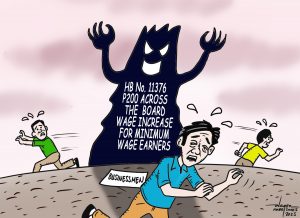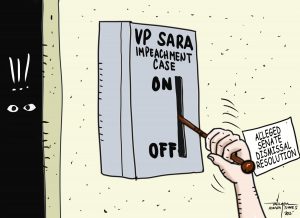LAST Monday the system of the Philippine Long Distance Telephone Co./SMART Communications went bust. This was between 10:30 in the morning until 4:00 in the afternoon.
We thought the loss of the internet service was only isolated in the place of our residence. But it was only later that we learned the busting of the service was widespread in the country.
Such incidents should give Education authorities serious chills in the light of the soon to be implemented on-line learning system.
Yes, if such a problem occurs more often when the on-line classes are already ongoing what is going to happen to the instruction processes? How will the Department of Education compensate for the lost time especially if the loss of the internet service will be for a much longer duration?
We believe that this possibility should make the DepEd wary and its officials need to really work closely with the Depart of Information and Communications Technology (DICT) to ensure that incidents like what happened last Monday can be avoided or at the least, minimized.
Of course we can understand that there is no such all one hundred percent perfectly functioning technology. Hence, such realization should be the reason why the eventuality be totally considered in DepEd’s and DICT’s planning for fallback measures if such an incident as last Monday occurs again during on-line class days.
************************
A cursory look into the problem now faced by the owners of the Paradise Island Resort and Costa Marina Beach in the Island Garden City of Samal (IGaCoS) in connection with the multi-billion Davao City-Samal bridge project, it appears that they are at a loss why their beach area has been chosen as the island side take-off.
The choice is being insisted by the Department of Public Works and Highways (DPWH) despite an earlier feasibility study conducted for the purpose by the Japan International Cooperation Agency (JICA) that another sites for take-off in Davao City and landing in Samal allow for a shorter span and less expensive bridge project.
Yes, in an article written for MindaNews by Antonio Colina IV, lawyer Julito Sarmiento, Executive Director and founder of Climate Change Adaptation Resettlement Earth (CARE) was quoted as saying in a virtual press conference that the Rodriguez family, owners of the two pioneering Samal resorts, are planning to go as far as resorting to the last option – petitioning the Supreme Court for the issuance of a Writ of Kalikasan. No, it is not to stop the bridge project; far from such purpose. Rather, it is for the DPWH and its Hongkong-based consultant Ove Arup, to reconsider the family’s request to transfer the route of the bridge.
In the same article it is apparent that Sarmiento’s group is also in full support of the Rodriguez family’s move. Sarmiento was emphatic that CARE and the resort owners share similar concerns on the destruction of marine biodiversity in the area when the Ove Arup-recommended route of the bridge will be pursued.
In their attempt to convince the DPWH to move the bridge’s location, the CARE executive, told MindaNews that the resort owners even presented the detailed findings of a study by a team of independent marine biologists led by Dr. Filipina Sotto, a commissioner of the Philippine Commission on Sports Scuba Diving.
The findings, according to Sarmiento, show that using the Ove Arup-recommended route of the bridge “would cause the rich marine biodiversity an ‘irreparable, irremediable, and incalculable damage’.”
In addition to presenting the study findings, the resort owners, Sarmiento told MindaNews, even offered to the DPWH to move the location of the Samal approach to another family-owned property, the El Paril Beach. But it seems apparent that the offer has not budged the position of the DPWH and its consultant.
Given all these, for those who are not in the know could only wonder why and how come the government is not willing to reconsider its position on the bridge route. They might be thinking why on earth that the DPWH has discarded the JICA-initiated feasibility study which recommended a shorter bridge span and thus less expensive project.
And even by reading the narrative in the news report based on the Sarmiento statement, it would seem that the Rodriguezes and CARE themselves are somewhat unaware of the reason of the DPWH persistence.
But to us, we have this idea that either the resort owners or the environmentalists organization are simply pretending not to know the reasons behind, or they are just too careful not to offend sensitivities of some influential persons in Davao’s economic, political and social communities.
Yes, it is too easy to read between the lines in the statements issued by the CARE official that they know the real answer why the group and the resort owners’ plea are being ignored by the DPWH. They actually betrayed their smoke-screened knowledge of the real reasons.
How and why? Well, in the same article lawyer Sarmiento mentioned about the apparent abandonment of the JICA study and recommendation which identified take-off and landing points in Davao City and Samal island. The JICA proposal targets a property in Samal owned by another family whose clout is definitely much stronger than the Rodriguezes’.
Of course the DPWH has its ready reasons to justify its choice of the Ove Arup plan. And it will stick to it come hell or high water. It can easily add that the agency cannot afford to delay construction because it has a deadline to meet. And clearly the agency is looking at the nearing end of the term of the Davaoeno President.




